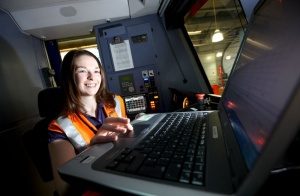Role: Technical Engineer
Company: Translink
Track Record:
What does your job involve?
I am a member of Translink’s technical division based in our York Road office and work on both bus and rail engineering projects. My role is diverse from executing site audits to ensure our property is energy efficient to updating new routes and passenger announcements on train passenger information systems. I am responsible for database programming and responding to our remote computer system that provides alerts on any train faults.
I train colleagues on how to use this system and undertake fault analyses. On the bus side, I’m currently involved in developing a new procedures and policies manual.
Do you think more women should consider this type of job?
I was the first female engineer in our York Road depot when I arrived back in 2002 and there are undoubtedly more men who work in this field as a whole but there is nothing preventing more women from considering a career as an engineer.
My father was a civil engineer so I’ve grown up surrounded by this area of expertise and I’ve always had a fascination with how things work.
What skills do you think are most important in your role?
You definitely need to be logical and an analytical thinker. There is a degree of database and statistical work involved in my role and you always need to be precise and accurate to reduce any margins for error.
Good communication skills are also essential as I am often responsible for training employees and need to ensure safe practices are adhered to. As with all engineering projects, good organisational and multi-tasking skills are required due to the wide range of tasks I undertake. Patience is essential as sometimes you need to find alternative ways of overcoming obstacles and meeting your goals. I deal with many suppliers too so good negotiation skills come in very handy.
How has your background helped you in this job?
I completed a BEng Degree in Engineering at the University of Ulster, Jordanstown, with a focus on both Mechanical and Electrical Engineering. This included a placement in Northern Ireland Water’s mechanical and electrical design department.
I graduated in July 2002 and started in Translink that September as a Graduate Engineering Trainee, where I was able to participate in a Professional Development Scheme delivered through the Association of Train Operating Companies (ATOC). This provided me with structured training including different placements and offered a fast-track to achieving Chartered Engineering status in 2007.
In fact, I was one of the youngest Engineers in Northern Ireland to achieve Chartership. I was appointed to the position of Technical Engineer after three years in Translink and, in 2008, I took a year’s career break to travel to Australia where I worked for the Perth Transport Authority, gaining more valuable experience in the field.
What training is required to do your job?
An Engineering degree is essential and Chartership is very desirable as it’s recognised internationally.
Of course, ‘on the job’ experience is invaluable. For the previous Class 3000 New Trains Project I was fortunate to be involved from the trains’ build in Spain to commencing passenger service back in Northern Ireland.
What is the most rewarding or exciting aspect of what you do?
My involvement in both New Trains Projects has been both exciting and rewarding; from the train design stage to initial metal cutting; train build and factory testing to on-track testing and passenger acceptance.
To see the careful execution of the production and delivery phases directly impact on growing passenger numbers has been very encouraging especially in anticipation of the forthcoming new trains’ arrival.
What are the biggest challenges?
Certain aspects of engineering projects can be slow and tedious and you need to be prepared to overcome setbacks and learn from experience.
Cost efficiency, safety and risk-limitation must be top priorities at all times but, fortunately, the mechanisms and necessary expertise to maintain these standards are in place, ensuring our projects can be delivered effectively on time and on budget.
What does the future hold for the sector you work in?
With the arrival of 20 new trains, the future of rail travel in Northern Ireland looks very promising.
We want to build on the success of the Class 3000 trains by enhancing the existing fleet and replacing old stock which will in turn enable timetables and frequency to further improve and hopefully ensure continued growth in passenger numbers.
There are also a series of additional infrastructure and upgrade projects being undertaken to prepare for the arrival of the new trains and I look forward to both new and existing projects operating safely and efficiently.
What are your interests outside work?
It’s important to be able to wind down outside work especially during major projects which require intense concentration and focus so I regularly attend the gym and travelling is also a passion. Fortunately that’s a bonus of my role — it’s definitely not a 9-5 desk job.


